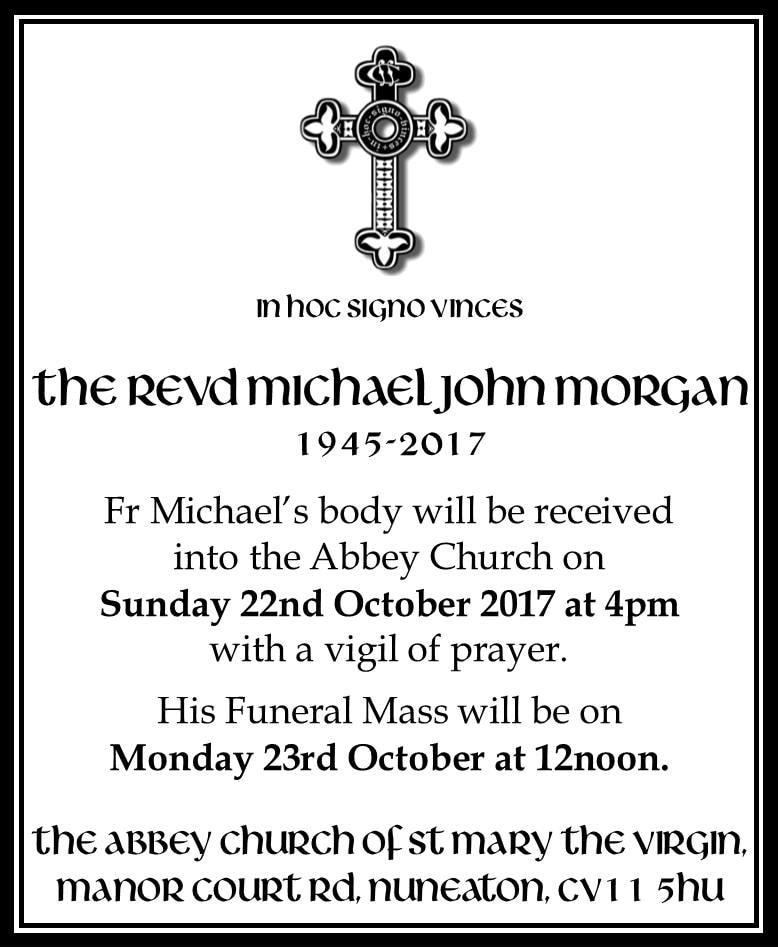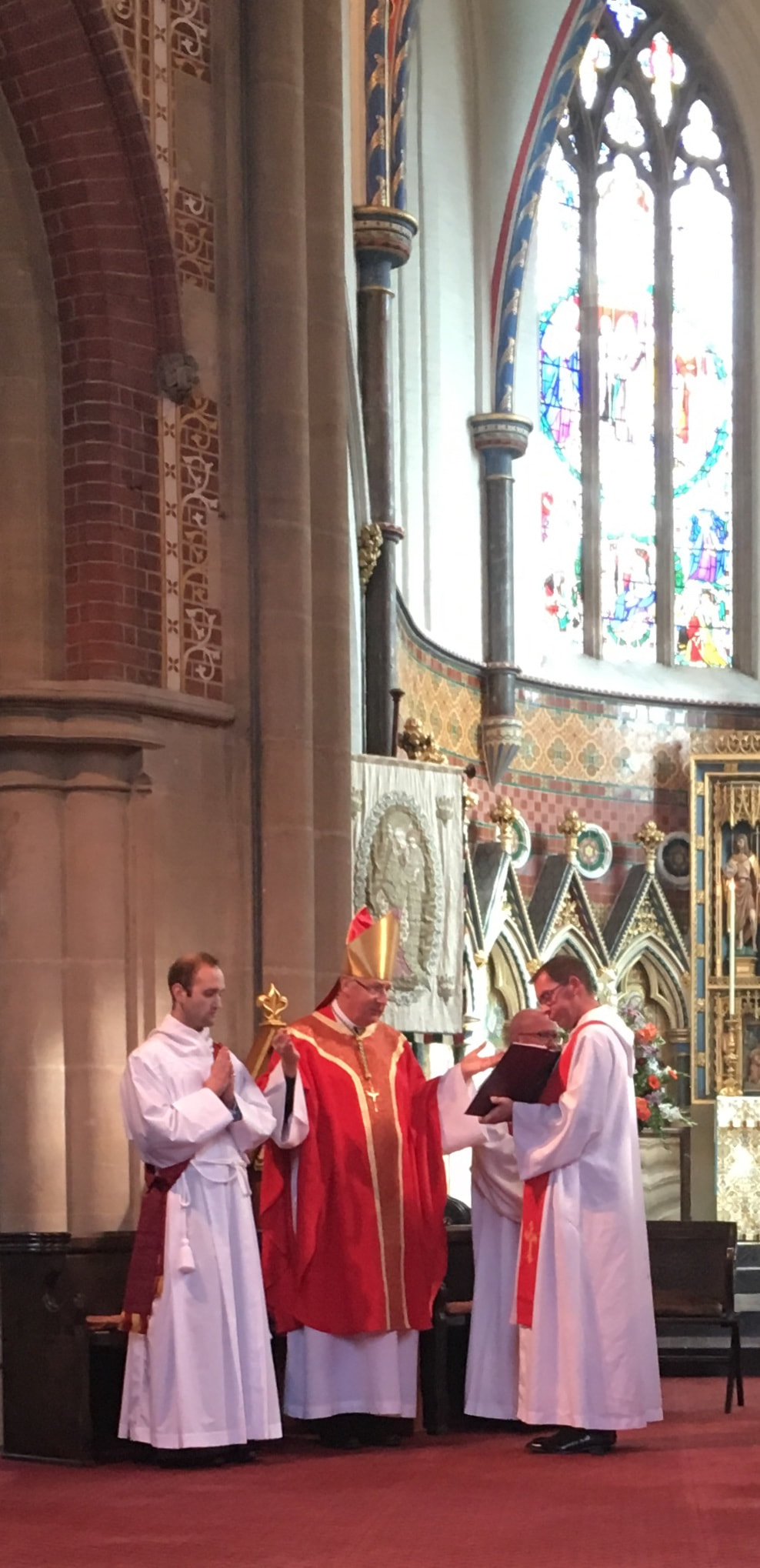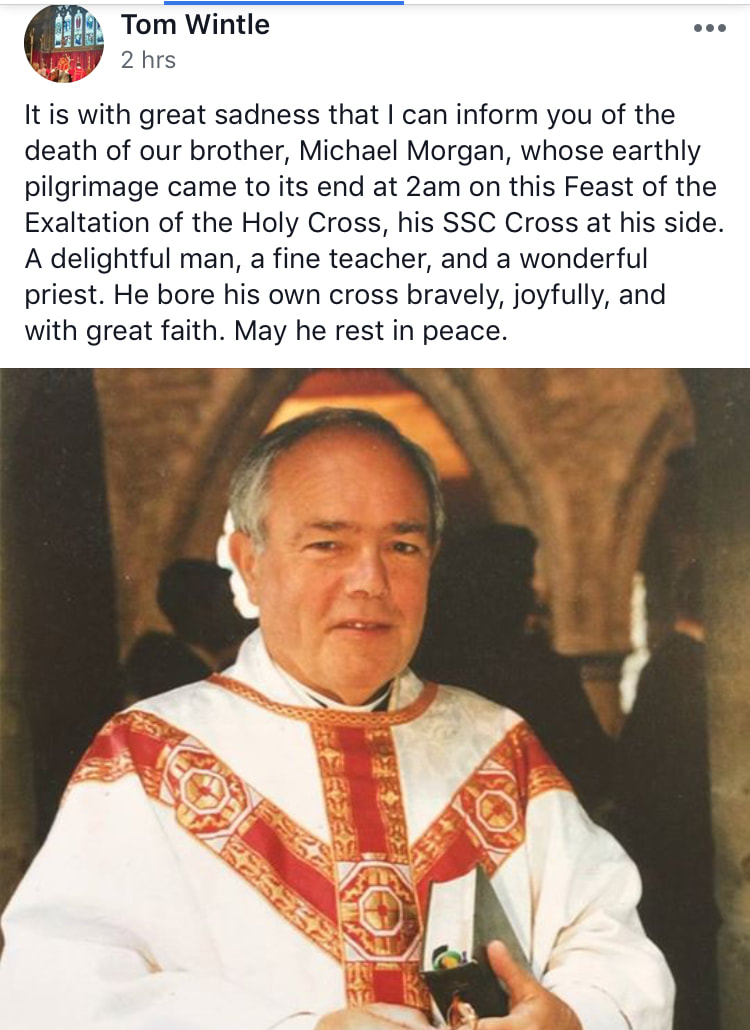|
Click 5 September 2017
Just a gentle reminder. There will be lots of comments on Social Media the Master would like to remind the brethren to carefully consider posts on social media and that in particular any posts are seen as respectful towards those with whom we disagree, as the Rule says. DAY TWENTY THREE The outward life of a Priest of the Society. Members of the Society in modelling their own lives on Christ, must endeavour to reflect his life in the way they live and be ready to put themselves at the service of others. In so doing: i.The Brethren shall do all in their power to support other priests in their ministry, avoiding criticising them or in any other way compromising the priesthood. ii.The Brethren shall be known for their forbearance and good manners, the more so when associating with those with whom they disagree. iii.The Brethren shall exercise charity in conversation and moderation in their recreational activities. They must avoid giving scandal in any form of personal behaviour. But what to those who find? Ah, this Nor tongue, nor pen can show; The love of Jesus what it is None but his loved ones know. NEH 385 A report of the review of nomination to the See of Sheffield by the independent reviewer Sir Philip Mawer has been published today. https://www.churchofengland.org/…/2…/09/independent-reviewer’s-report-on-see-of-sheffield-published.aspx https://www.churchofengland.org/…/independent-reviewer-shef… https://www.churchofengland.org/…/independent-reviewer-shef… to edit. SSC Chapter at St Saviour’s Eastbourne The Exaltation of the Holy Cross - September v 14 2017 Numbers 21.4–9; Philippians 2.6–11; John 3.13–17 Today the church celebrates the exaltation of the holy cross, as it has done for 1700 years. On this day, September 14, in the year 335, a great crowd of Christians gathered in Jerusalem for the dedication of the Basilica of the Holy Sepulchre, which had been renovated by the Emperor Constantine. That celebration also commemorated the discovery of what people believed to be the wood of Jesus’ cross. Since then, in Jerusalem, this event has been celebrated every year. Even today the celebrant priest lifts up the cross, and points it in the four directions of the compass, to indicate the universality of salvation in Jesus Christ. What was accomplished on the cross, was accomplished for all people, everywhere, and that is the truth that the church is called upon to lift up before all people, and everywhere. And perhaps, in the world and society in which you and I live and minister now, let me suggest that it is as necessary as ever, if not more necessary than ever, to ‘lift high the cross’ in every corner of human life to demonstrate the sacrificial love through which Jesus brings hope and salvation to humankind? But first let me begin with another ‘lifting up’ – that referred to in both the OT Reading and in the Gospel - Moses lifting up a serpent in the wilderness. It’s an extraordinary story of the people in Israel wandering in the wilderness after their escape from slavery in Egypt. But all is still not well with them. They find themselves attacked by a plague of venomous snakes whose bites poison people and bring about deaths in large numbers. Guided by God’s grace, Moses takes a snake, the sign of death, impales it upon a pole, the branch of a tree, and holds it up before people as a sign that God is with them, God brings healing and wholeness rather disfigurement and destruction; life and hope not death and despair. And that set me thinking about the snakes in life today, those venomous things that inject poison into human life, human relationships and human communities, and which are desperately in need of confronting, outfaced and being overcome. There are of course the big things to be found both in so many parts of the world today; the poison of poverty and hunger, especially where these are the result of governments, and multinational companies, or patterns of trade and international agreements, which exploit and misuse power and wealth for their own ends. There is the poison of war and conflicts which do not cease to create deaths, while leaving many feeling indifferent, or at best powerless. There is the venom of the abuse of women and children, sexually exploitation and the trafficking that leads to enslavement in so many different ways. But much closer to home there is the poison that is so often to be found in broken relationships, the poison of jealousy and resentment, of anger and self-justification. There is the venom of mistrust, or a culture of blame, the poison or arrogance or fear, the toxic misuse of power, that can enter the life of a community, or a congregation, or Church, and poison its atmosphere. There is the bane of isolation or shame that pollutes the lives of individuals. You don’t need me to go on, you can all think of examples for yourself. The point for now is that confronting these snakes and dealing with them is one of the things that is central to role of a priest. And it is a role that is carried out in several different ways. Sometimes it is done prophetically, telling things as they really are, stating clearly in any given situation just where God is present and where his presence is being denied; helping people to see what it is that He will bless and what He will not; or in calling a lie to sham and hypocrisy and dehumanizing wherever they are to be found, and whatever form they may take. Sometimes, simply naming the demons, lifting up the snakesbefore people’s eyes, helping people to see what is there, what is really going on, is enough to change attitudes and behaviour. Certainly at the heart of all priestly and episcopal ministry is that ability, which can only come from being steeped in the study of scripture, and from prayer, to have one’s finger on the pulse of ‘what is’, in such a way that there can be discernment about ‘what is likely to be’, unless things change, and then to give a vision of ‘how things may be’ when there is real repentance – a seeing things afresh within the purpose of God But alongside this prophetic ministry in confronting the poison of this world, there is the all importantpastoral ministry of coming alongside people who have been affected by these poisons, and bearing the hurts with them and helping to bind their wounds and working to bring healing and peace. And this calls for a ministry of presence – of knowing those in your care and being known by them – so that you are able to come alongside, and listen and understand, sometimes offering wisdom and godly counsel, sometimes practical advice and doing very practical things, sometimes simply silently hanging in their, bearing the pain. And that brings me to that aspect of our ministry which is most truly priestly. Priesthood, in the words of the late Archbishop Michael Ramsey, is all about exercising a vocation to stand before God with the people on your heart and before the people with God on your heart in turn. It is on your knees in prayer, and standing at the altar, that the poison that so disfigures this world is most held, and confronted, to be transformed by the grace of God. And that brings me back once more to the exaltation of the cross. In the New Testament we see how people whose lives had been touched and transformed by Jesus looked back at that incident where Moses lifted up the serpent in the wilderness, and saw it as prefiguring, or pointing to the work of Jesus on the cross. St John wrote quite explicitly about this in that gospel reading that we heard. But he is also clear that there is one crucial difference, between what happened with Moses in the wilderness, and what happened with Jesus, on the hill of Calvary. On the pole in the desert was a snake; and one might say that it did not cost Moses much to put it there, simply a willingness to trust what God would do. By contrast on the cross on Calvary was a human being, a good human being – a perfect human being, one whose one desire was to be all that he had been conceived to be, and for him to be there cost him everything. ‘He saved others, but he could not save himself’ the religious leaders had gloated, as Jesus hung there in agony in the hot midday sun, the blood draining from his body as the birds were already pecking at his wounds. And, the thing is, they were right – absolutely right. He did save others precisely because he not only would not, but could not save himself. At least he could not save himself and still be true to his own nature because that nature was, and is, love. And the one thing that love cannot do is put aside others in the interest of self. Self-concern, self-protection, self-serving and self-seeking – these things are the very antithesis of love. As we heard in our second reading, St Paul understood that Jesus’ path to the cross was something that had marked his whole life: although God’s Son, he did not regard equality with God as something to be exploited.’ Because of love, ‘he emptied himself, taking the form of a slave’ and because of love ‘he humbled himself and became obedient to the point of death, even death on a cross.’ And so he gave us a pattern of loving and living for our own lives. ‘Save yourself!’ - that is so often the gospel of the world: save yourself at any cost, even when it is costly to others. But that is not the gospel of Christ, the gospel of the cross, the gospel of love, the Gospel of the Holy Cross, the vocation to which you are bound. The central, unwavering, message of the cross is this. The figure of the crucified is the face of God. Here is God, who from the beginning of creation loves the whole world, and loving it, bears its weight, is exposed to its flaws and sins, absorbs its cruelty and hatred, shares to the ultimate degree its suffering, and yet is still there. That is what is indestructible, the permanency of love. That is what is demonstrated when the tomb cannot hold him, and new life bursts forth on Easter day. Christ is raised not through some final trick on his part to escape the death which will claim you and me. Christ is raised by the power of love, because that is love’s nature – it will not let go, it will not be extinguished and, because of that, it will in turn raise you and me – and not just from final death, but from all those little deaths, those sins and failures of self-concern and betrayal of God and others which taken together nailed Jesus to that tree. That ultimately is how the snakes and serpents of this world are confronted, and the poison and venom that so hurts human life is overcome. And down through the years if history and human experience teach us anything, it is that the only force that is truly capable of changing and re-forming human life is the power of selfless, costly love. ‘Lift high the cross’ Today’s feast invites each one of us, and also together as a Society, to so hold the cross before our own eyes, and the eyes of all those whom we serve in the ministry to which the Lord has called us, that all might then see just how much God loves the world, every single one of us, that everyone who has eyes to see this, and be changed by it, will not perish from the world’s poison, but most truly have eternal life, life in all its fullness, life as it was intended to be. And we are to do it in such a way that every other Christian disciple is helped to play their part, too, in confronting the snakes and the poison of this world in witness and in prayer, in acts of compassionate service, and most of all through lives suffused with generous, self-giving sacrificial love. We adore you, O Christ, and we bless you; because by your cross, you have redeemed the world. Michael The program for the Synod looks very good the synod timings are on the Synods 2017 Page. Also you will find the updated Accounts for you to look at before the Synod. Please remember if for genuine extraordinary reasons you cannot make the synod to ask for dispensation from [email protected] Fr Spicer.
|
Keep up to date with the News from SSC subscribe to the email alerts sent out each day there is news delivered between 9-11pm GMT.CONTACT WITH NEWSContact Fr Mark Archives
February 2023
Categories |
- Home
- Province of England and Scotland
- News
- 2024 SSC Regional Synods
- Master's News (Password)
- Master General's Page
- The Pusey Guild
- Resources (Password)
- Acta (Password)
- ITEMS FOR SALE
- SSC Calendar
- Fan the Flame
- Web Site
- The Rule (Password)
- Daily Office
- Vocations
- Mission Direct
- Chapters
- History
- Links
- Safeguarding



 RSS Feed
RSS Feed